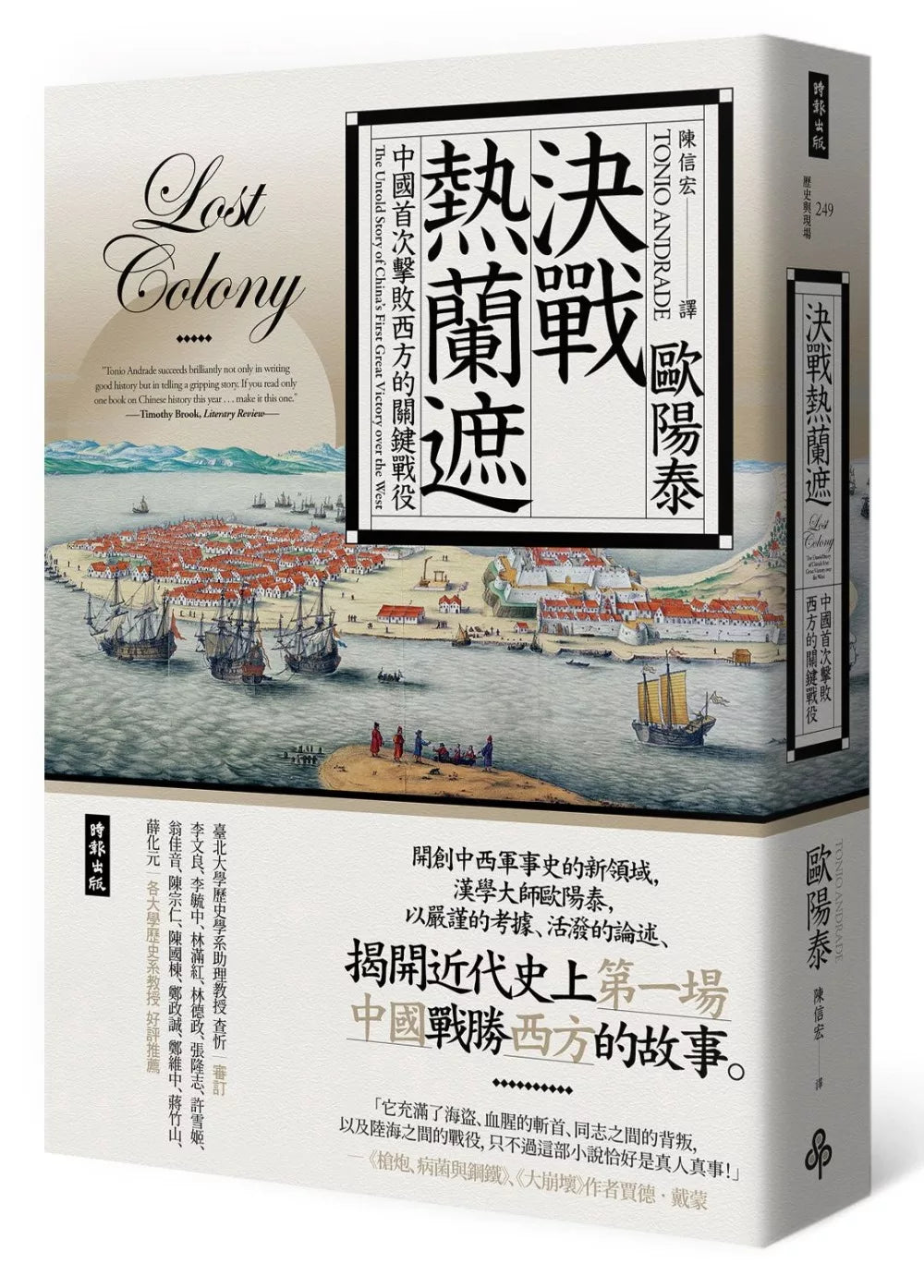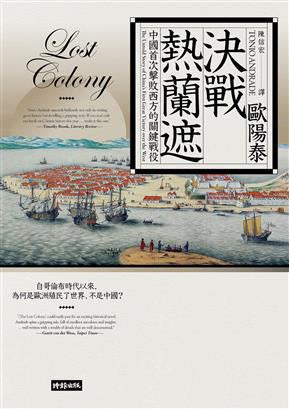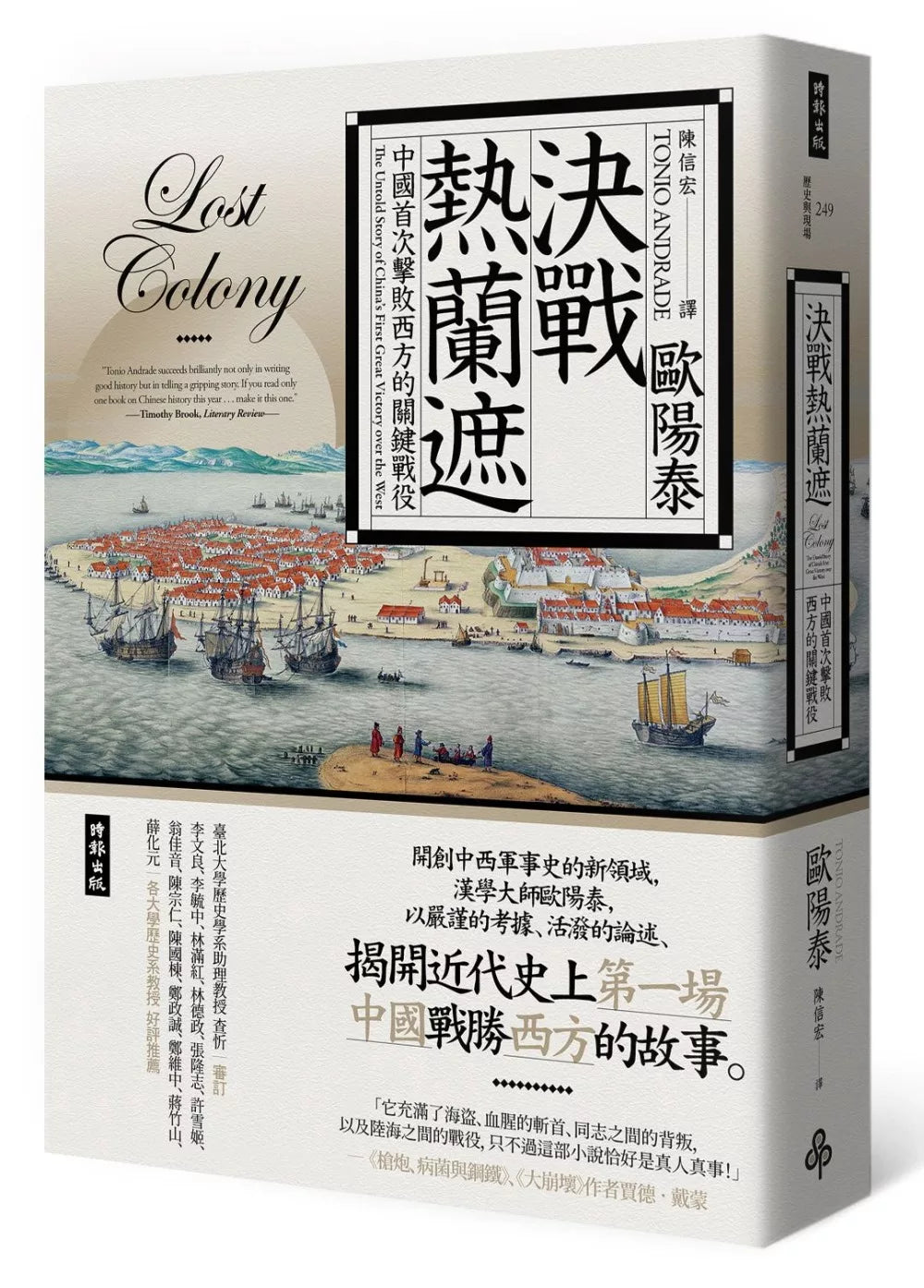1
/
of
2
The Battle of Zeelandia: China's First Crucial Victory over the West (Newly Revised Edition)
The Battle of Zeelandia: China's First Crucial Victory over the West (Newly Revised Edition)
Ouyang Tai Chen Xinhong 译
Regular price
$26.99 USD
Regular price
Sale price
$26.99 USD
Unit price
/
per
Low stock
Couldn't load pickup availability
About Book
About Book
Lost Colony: The Untold Story of China's First Great Victory over the West
▂▂▂▂This battle changed Taiwan's destiny for a century▂▂▂▂Opening up new areas of Chinese and Western military history,
Ouyang Tai, a disciple of Shi Jingqian, used rigorous textual research and lively arguments to
Uncover the story of China's first victory over the West in modern history.
"It is full of pirates, bloody beheadings, betrayal of comrades, and battles by land and sea.
Except this novel happens to be based on a true story!" -- Jared Diamond, author of Guns, Germs, and Steel and Collapse
In 1661, Zheng Chenggong's restoration efforts suffered setbacks. He retreated from Nanjing to Xiamen, preparing to attack Taiwan. He wrote to the Dutch East India Company governor in Taiwan, Kowloon, expressing his desire to reclaim the lands his father, Zheng Zhilong, had "leased" to the East India Company. By then, the East India Company had ruled Taiwan for over thirty years, making it the Netherlands' largest overseas colony. As the governor of Taiwan, Kowloon was naturally reluctant to cede these territories. Conflict erupted, culminating in the year-long Taiwan-Dutch War.
At that time, the Netherlands won the competition with Britain and defeated Spain and Portugal to become the most powerful empire in the world.
Yet, the Dutch, with their rigorous military training, superior naval skills, and ships equipped with cannons, were defeated by what they viewed as a naval force of pirates and merchants. Why?
The rising sinologist Ouyang Tai, tackling a crucial question in global history: "Why did the West, rather than China, dominate the formation of the modern world?", identifies the significance of Zheng Chenggong's battle with the Dutch East India Company. With this battle as the central theme, Ouyang Tai meticulously describes the details of this most significant conflict in world history of the 17th century, and how the differences in military technology and strategy between Taiwan and the Netherlands enabled Zheng Chenggong to reverse a potentially disastrous outcome.
Through this battle, which shaped the future of East and West for the next century, we gain a glimpse into the depths of the development of gunpowder technology and the impact of technological warfare on the winners and losers. It also dispels the previous inference that "the West made rapid progress after the 15th century" and verifies that the power of China and the West was still evenly matched in the 17th century.
This book blends the strengths of European military excellence and historical revisionism, making it a masterpiece in military history. Even more remarkable is that Ouyang Tai has honed his extensive literature, simplifying the complexities and reconstructing the very scene of the Taiwan-Dutch War, allowing the reader to experience it as if they were there, with a bird's-eye view of the situation. This is a remarkable work that scholars of Taiwanese history and the general public should not miss.
Good reviews and recommendations
Li Wenliang (Professor, Department of History, National Taiwan University)
Li Yuzhong (Associate Professor, Institute of History, National Tsing Hua University)
Lin Manhong (Researcher at the Institute of Modern History, Academia Sinica)
Lin Dezheng (Professor of History, National Cheng Kung University)
Zhang Longzhi (Associate Researcher and Deputy Director of the Institute of Taiwan History, Academia Sinica)
Xu Xueji (Director of the Institute of Taiwan History, Academia Sinica)
Weng Jiayin (Associate Researcher, Institute of Taiwan History, Academia Sinica)
Chen Zongren (Associate Researcher, Institute of Taiwan History, Academia Sinica)
Chen Guodong (Researcher at the Institute of History and Philology, Academia Sinica)
Zheng Zhengcheng (Professor and Director of the Institute of History, National Central University)
Zheng Weizhong (Assistant Researcher, Institute of Taiwan History, Academia Sinica)
Jiang Zhushan (Associate Professor, Department of History, National Dong Hwa University)
Xue Huayuan (Institute of Taiwan History, National Chengchi University)
The Battle of Zeelandia is the first major war fought by the Chinese against Europeans in Taiwan, a decisive victory that ushered in the Ming Dynasty. Many have written about this war, but Ouyang Tai strikes a unique note. In The Battle of Zeelandia, he blends global history with microhistory, using the larger to illuminate the smaller, and vice versa, bringing a seemingly trite historical event to life. He also incorporates elements like climate and weather, broadening his perspective from the human to the natural. Combining deft prose with a vibrant imagination, he tells stories that have never been told before.
Guodong Chen, Research Fellow at the Institute of History and Philology, Academia Sinica
Researching war history, or military history, is difficult. Unless one is familiar with the primary sources left by commanders, participants, and witnesses on both sides, it's impossible to fully grasp the detailed descriptions of each side's weapons, strategies, difficulties encountered, and the commanders' considerations. Author Ouyang Tai meticulously crafts this book, meticulously processing historical materials to vividly depict the 17th-century Zheng-Dutch War, bringing the commanders and participants of both sides to life. This is a delightful read for all ages. More importantly, this war is part of Taiwan's history. Past omissions and ambiguities in education have been clarified, allowing us to re-recognize the decisive battle between Zeelandia and Zheng Guoxing as not only "the first war between Europe and China," but also a crucial battle that determined Taiwan's future history.
Xu Xueji, Director of the Institute of Taiwan History, Academia Sinica
"The Final Battle of Zeelandia" is a captivating historical masterpiece! Readers who enjoy micro-narratives will discover the diverse characters and activities that played out on the Taiwanese island stage in the 17th century. Scholars who appreciate macro-analysis will appreciate how the author reinterprets the Zheng-Holland War of 1661–1662 from the perspectives of global history, climate history, military history, and the history of East-West transportation. After reading the book's fascinating stories, you will discover that Guo Xingye is no longer a distant national hero but a distinguished military strategist with a distinct personality. The Dutch are no longer representatives of advanced European civilization but rather part of a complex network of trade and military activities in East Asian waters during the early modern period. Through Ouyang Tai's brilliant writing and rigorous argument, we will also begin to question the stereotypes of a progressive West and a backward East, and rethink the dominant interpretation of the Great Divergence in Eurasian history. Taiwanese history is actually world history!
Zhang Longzhi, Associate Researcher and Deputy Director of the Institute of Taiwan History, Academia Sinica
Ouyang Tai not only writes history, but also tells stories.
Li Yuzhong, Associate Professor, Institute of History, National Tsinghua University
Ouyang Tai depicts the mid-seventeenth-century conflict in southwestern Taiwan as a clash between the two leading military powers of the time, East and West. This allows military historians, originally working within Eurasian contexts, to engage in dialogue and rethink the dynamics of the modern world. He effortlessly transforms archival documents into vivid narratives, using a narrative rich in emotion and humor to vividly recreate historical scenes, making reading a delight.
Li Wenliang, Professor of History, National Taiwan University
The Zheng He Battle that intersected the Taiwan Strait
A thrilling chapter in Taiwanese history is the standoff between Zheng Chenggong and the Dutch from late April 1661 to February 1, 1662. Few works offer such a clear and engaging account of this momentous event, and this book is a rare find.
The Zheng-Dutch relationship spanned three generations of Zheng Zhilong, Zheng Chenggong, and Zheng Jing. Dutch occupation of Taiwan was the result of the Dutch East India Company's eastward expansion in the 17th century. The two forces met across the Taiwan Strait, from the Fujian coast through Penghu to Taiwan, sparking the "Zheng-Dutch War," a fierce battle that marked the beginning of the Sino-Western conflict.
This book draws on a wealth of primary historical materials and images from both China and the West, and is written in a literary style. Despite this, it is not fictional but grounded in evidence: narrative and argument are interspersed with natural science considerations such as climate change, artillery manufacturing, battleship construction, and fortification techniques.
The author Ouyang Tai compares Chinese and Western historical materials, using them as a secret weapon to explain and highlight history. It is full of depth and is extremely exciting.
This book is a must-read for anyone who wants to understand Taiwanese history during the Dutch colonial period. The author's scholarly prowess is commendable, and the translator, Chen Hsin-hong, has truly achieved fidelity, elegance, and clarity, bringing the original work to life for Chinese readers in a brilliant and insightful manner.
This is a solid and well-written book. Anyone interested in Taiwanese history should definitely read it!
Lin Dezheng, Professor of History, National Cheng Kung University
"The Battle of Zeelandia" vividly depicts the confrontation and wartime machinations between the Restorationists and the Red-Haired Barbarians during the 17th-century Age of Exploration. With its diverse scenes and props, including disease, typhoons, walruses, castles, troops, artillery, and warships, the film ultimately won Best Actor for the role of the King of Yanping, while the Governor of Formosa, who fought hard to turn the tide but ultimately lost, took home the Best Supporting Actor award. This is a high-quality foreign film that highlights the vigorous defense of the Tulip Kingdom's overseas branches in the old imperialist era. It's also a compelling domestic film about the CEO of a maritime conglomerate, who champions the anti-Qing and restorationist Ming campaigns, and how he envisions the resurgence of the Eastern Capital and the counterattack against the Qing Empire on the west coast of the Taiwan Strait. It's a film worth revisiting.
Zheng Zhengcheng, Professor and Director of the Institute of History, National Central University
If you think that Ouyang Tai's book only tells the story of Taiwan's history, then you are completely wrong. He is actually talking about global history, and it is a revisionist global history.
This global historical portrait, depicting the conflict between the King and the Dutch East India Company, breaks away from the singular Asian or European perspectives of previous military historians. Its narrative technique is as exciting and novelistic as it is breathtaking.
Chiang Chu-shan, Associate Professor, Department of History, National Dong Hwa University
This book can be read as a thrilling novel, filled with pirates, swaggering characters, gory beheadings, comrade betrayal, and battles on land and sea—except this novel happens to be based on real events—or as a revealing exploration of the little-known first war between China and the West, and one that delves into one of the greatest mysteries of world history: why was it Europe, and not China, that colonized the world since the time of Columbus? Either way, this book is sure to leave you wanting more.
Jared Diamond, author of Guns, Germs, and Steel and Collapse
Filled with captivating anecdotes, vibrant detail, and the thrills of contemporary fiction, Ouyang Tai's book redefines the debate between revisionists and neo-traditionalists: did—and to what extent—Europe's dominance in the early modern period reflect its technological and military superiority over Asia? The analysis is both insightful and persuasive.
Victor Lieberman
Professor of History at the University of Michigan
Based on a thorough reading of Chinese and Dutch literature, The Final Battle of Zeelandia examines fascinating interpretive issues and explores the changing nature of military power in various regions of the world during the early modern period. This is a solidly argued and important book that tells a superb story.
John E. Wills
Author of "1688: From Emperor Kangxi to the Greek Wanderer, the World in That Year"
This engaging and meticulously written book attempts to find a balance in the age-old debate over European military preeminence. Examining a pivotal conflict between Asian and European armies, Ouyang Tai explores Dutch colonial activities in Asia and the often symbiotic relationship between Dutch and southern Chinese ventures, showing how the Chinese, through a combination of perseverance and luck, acquired Taiwan by adopting and countering enemy military technology.
Michael Laffan
Professor of History at Princeton University
Publication Date
Publication Date
2017-12-26
Publisher
Publisher
時報出版
Imprint
Imprint
Pages
Pages
464
ISBN
ISBN
9789571372174
share



